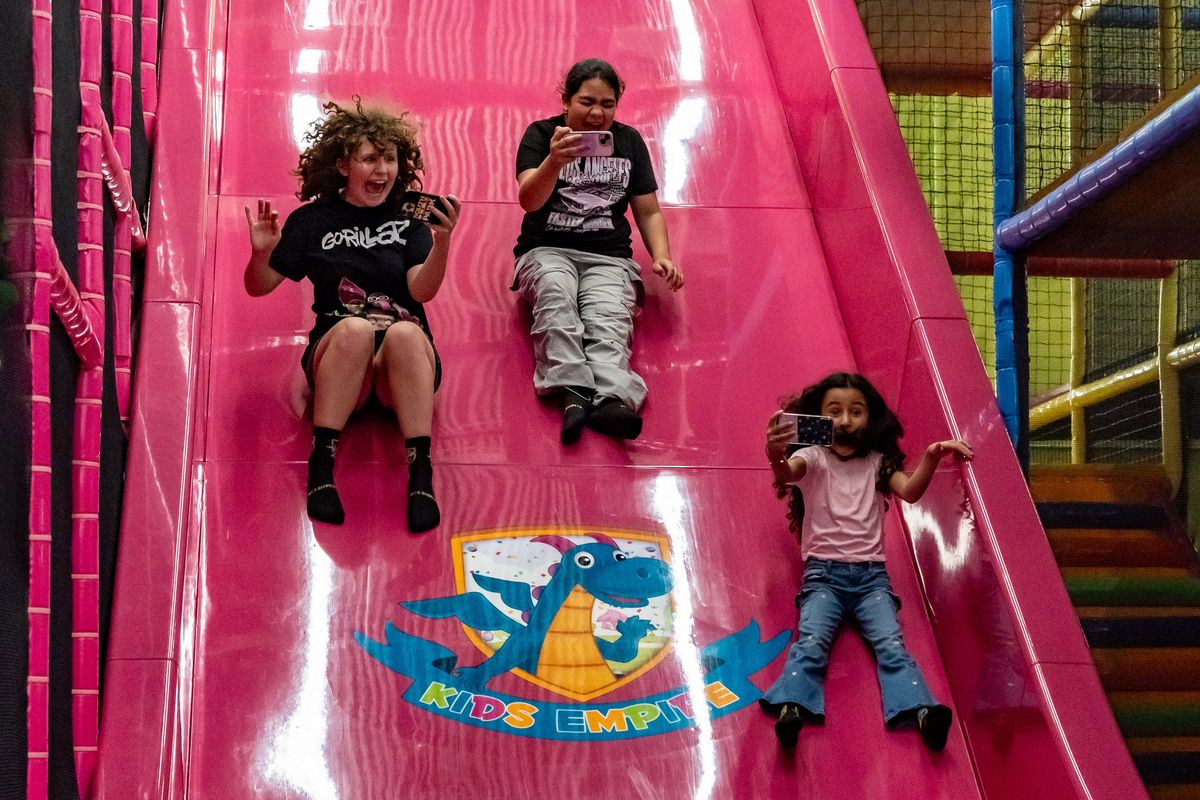We’ve all heard jokes about the “Gen Z stare,” and perhaps have even made a few jabs ourselves. But after hearing Texas-based therapist Austin Calo’s nuanced, empathetic take on why this generation often seems so apathetic, we might be moved to hold off on the wisecracks.
Calo, who regularly posts therapy content on his TikTok, recently went viral for sharing his observations about his Gen Z clients. The first thing he discussed was the collective “external locus of control.”
Calo explained this as a mindset of thinking “something is happening to you rather than you impacting it." He mainly attributed this to Gen Z entering adulthood during a global pandemic, which was obviously so disruptive and debilitating that many of us, Gen z or not, began to develop a nihilistic point of view.
“Naturally, you would detach from the result and view yourself as relatively powerless,” he said.
Next, he brought up social media. Which, yes, we’ve talked at length about the negative impact social media’s mainstream presence has had on young adults especially, but Calo nonetheless offered some different insight.
He noted that the Internet, an omnipresent “faceless” place where one can easily be publicly humiliated, has not only exacerbated a “fear of being cringe,” but "shattered" a sense of real community. However, since we are still naturally hardwired to seek community, we do it digitally.
This is why Calo has seen so many Gen Zers “hyper-pathologizing” mental illness or clinging to a sexual identity online, because at least being “boxed” into a group provides some sense of belonging, however artificial. This of course adds unnecessary pressure to immediately carve out a brand of sorts rather than simply exist and explore.
“There's not a sense of openness to figure something out or that it'll come in time or later, there's this pressure to identify with something right now."
And yet, the possibly positive consequence of being chronically online, Calo noted, is that Gen Zers generally have higher media literacy. “They know what you're trying to do, they know you're trying to manipulate them, so there's a sense of, um, kind of collective resistance to, like, pandering, you know?"
Still, this higher media literacy doesn't necessarily protect Gen Z from being manipulated or marketed to, Calo argues. In fact, he says the odds are even higher of it happening, because being exposed to a catered ‘For You' page “wears you down over the course of time.”
In essence, Gen Z’s detachment is mostly a trauma response, “[Be]cause it feels like something's asked of them all the time,” according to Calo.
Calo concluded, “I see these takes online of trashing Gen Z or, like, the Gen Z staring stuff. This is to help understand and empathize with a generation that feels totally powerless in the face of a polarizing political climate and being marketed to and politicized on social media, meaning being manipulated on social media through politics...and so I think it's helpful to have a sense of empathy rather than 'Oh, these kids...'"
Calo’s video, which garnered 2.7 millions views, clearly struck a chord with Gen Zers, who flooded the comments with thank you’s and shared how other factors, like climate change, politics, and the economy have impacted their mindset.
“Gen Z and I definitely feel like I don’t actually ‘exist’ in the world. I often feel like I’m observing life and not actively participating in it…I don’t really have any expectations for my future and have adopted a mentality of whatever happens, happens.”
“Also the environment! We grew up being told that we wouldn’t see our children grow up unless people made changes and then we had to watch those things just…not happen.”
“We are pretty powerless: failing economy, dying plenty, no no hope.”
“So many of us try to make a career like we were told but unless you were born with money it seems like a losing game. I have a degree and I don’t feel further along than I did four years ago.”
“Another thing I think is that a lot of Gen Z has found out about the human condition and how utterly disappointing life can be through political agendas and manipulation through media.”
And yet, Calo upholds his belief that, despite these warranted coping mechanisms, Gen Zers are "incredibly resilient and courageous.” They just have trouble seeing that strength within themselves. For that, Calo has a bit of advice, which he shared with Buzzfeed.
"Boldly challenge the voices in your head and incessantly trace them until you’ve found the source. All ideas have an origin,” he said. “We wear others’ ideas all the time…You might find your actual voice is far more encouraging, hopeful, self-assuring, and kind than you may believe."
He added, "Think of who has positively impacted your life and treat yourself the way they’ve treated you. You might find that you are worth that love and adoration after all."
Honestly, that sounds likes pretty good advice, no matter what age you are.
Keep up with Calo (including updates on his music!) on TikTok


 Sandra’s granddaughter, E’s daughter, and another friend at an indoor park (July 2025)
Sandra’s granddaughter, E’s daughter, and another friend at an indoor park (July 2025) One of the ladies Sandra sponsored from Venezuela and her partner during Sandra’s first visit to meet her (December 2023)
One of the ladies Sandra sponsored from Venezuela and her partner during Sandra’s first visit to meet her (December 2023) A handwritten note with the words "good job!" on it
A handwritten note with the words "good job!" on it A man smiling
A man smiling A dad with his kid on his shoulders
A dad with his kid on his shoulders Im Old Tv Shows GIF by PBS SoCal
Im Old Tv Shows GIF by PBS SoCal  Kelsey Grammer as Dr. Frasier Crane in 1996By US Treasury Dept. Public Domain
Kelsey Grammer as Dr. Frasier Crane in 1996By US Treasury Dept. Public Domain An open book sitting on top of a table next to a candle. Photo by
An open book sitting on top of a table next to a candle. Photo by  A lake surrounded by mountains. Photo by
A lake surrounded by mountains. Photo by